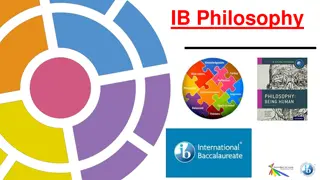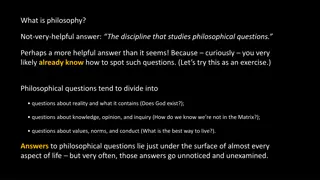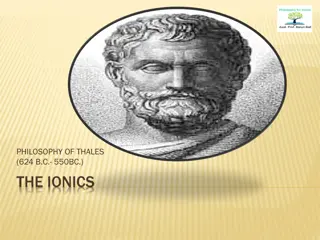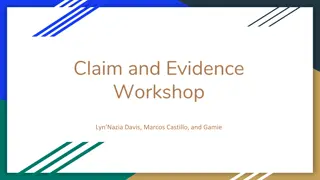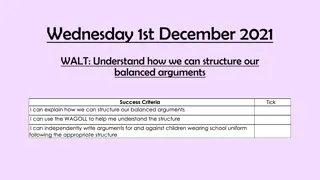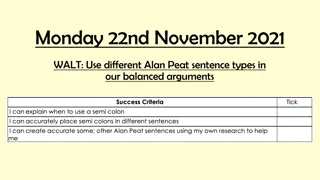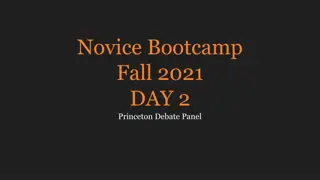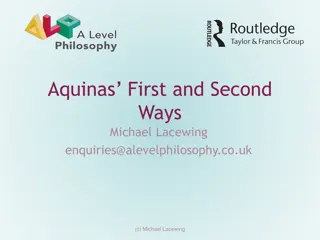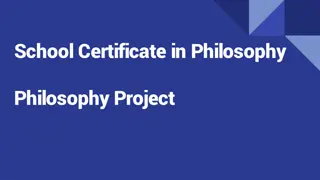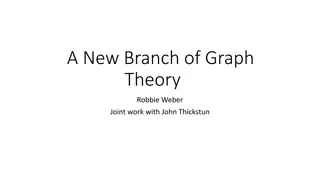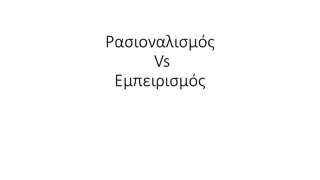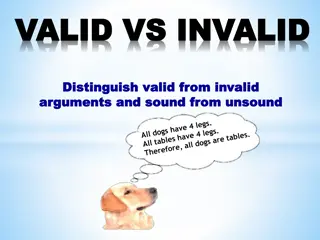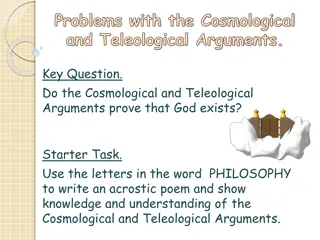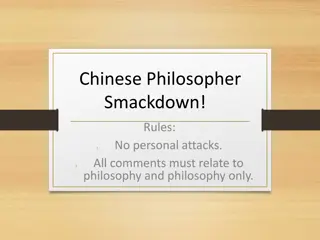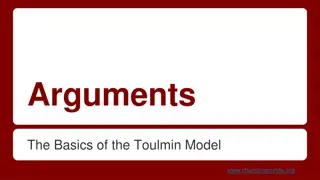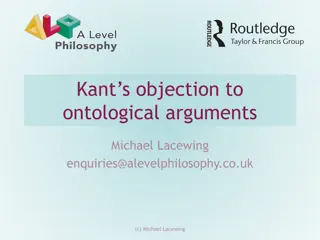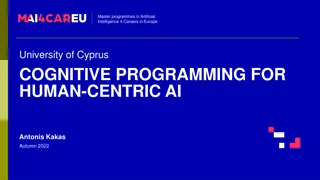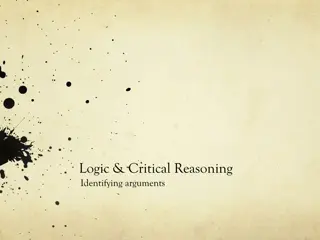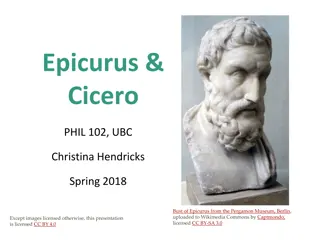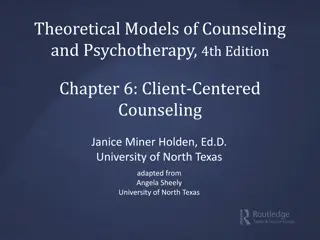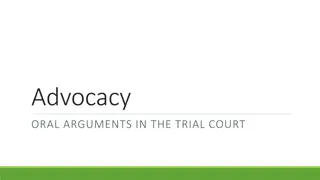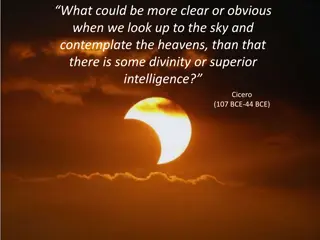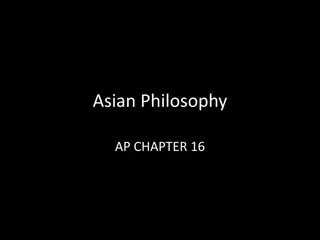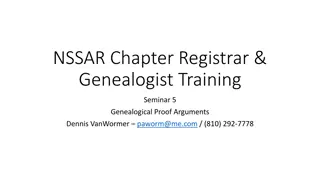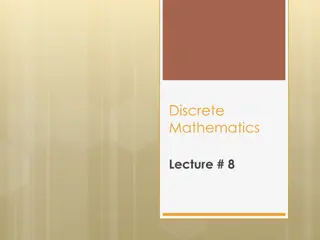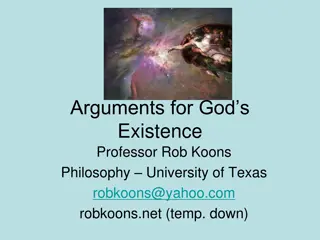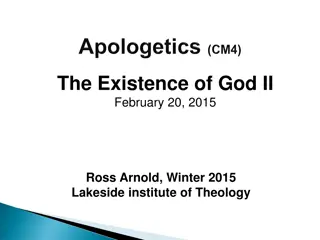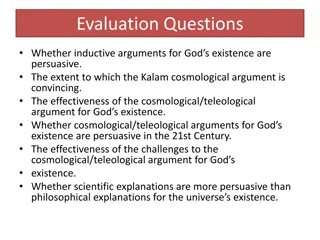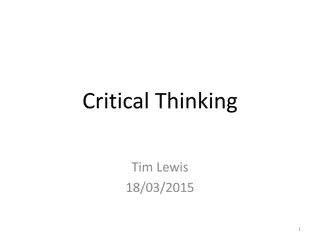Exploring the World of Sociology through Philosophy
This philosophy course delves into engaging with influential thinkers, encouraging students to actively participate in philosophical activities. Covering topics on being human, ethics, religion, philosophical texts, and contemporary issues, it also emphasizes internal assessments and stimulating int
2 views • 15 slides
Understanding Philosophy: A Guide to Philosophical Questions and Debate
Philosophy delves into questions about reality, ethics, and knowledge. Studying philosophy involves constructing logical arguments to explore and understand these fundamental inquiries deeply. As a student, you'll develop critical thinking skills to engage in philosophical discussions and analyze di
0 views • 5 slides
Philosophy of Thales: The Ancient Wisdom of the Ionic School
Thales of Miletus, a key figure in the Ionic School of philosophy, is considered the father of philosophy. He believed that water was the principle of all things and made significant contributions to mathematics and astronomy. Thales's wisdom and engineering feats, such as diverting the river Halys,
0 views • 18 slides
Mastering the Toulmin Method for Constructing Persuasive Arguments
Learn how to effectively structure arguments using the Toulmin Method, which consists of Claim, Data, Warrant, Backing, Counterclaim, and Rebuttal elements. Explore reasoning and logic concepts, differentiate between inductive and deductive reasoning, and understand how to construct valid arguments
0 views • 30 slides
Understanding the Structure of Balanced Arguments
Explore the concept of using the third person in writing balanced arguments to maintain objectivity and structure. Learn about third person pronouns and the importance of being unbiased in your writing. Understand the significance of structuring your arguments and maintaining a clear order for effec
0 views • 11 slides
Mastering Alan Peat's Balanced Arguments with Different Sentence Types
Explore the use of various Alan Peat sentence types in crafting balanced arguments, focusing on incorporating semi-colons effectively. Engage in interactive activities and practice sessions to enhance your skills in creating compelling arguments. Dive into examples and exercises to refine your under
1 views • 12 slides
Mastering Debate: Essential Strategies and Techniques
Learn key concepts like argument structure, points of clarification, and how to make compelling arguments in a debate setting. Discover the importance of warrants, impacts, and implications in formulating strong arguments. Explore tips on coming up with effective arguments and understanding differen
0 views • 47 slides
Mastering Final Focus in Debates
Final Focus, a crucial 2-minute speech at the end of a debate, serves as your last chance to persuade the judge of your victory. It involves comparing key voters and emphasizing the impact of your arguments. Weighing key voters is essential, with a focus on demonstrating why the scale tips in your f
1 views • 4 slides
Exploring Aquinas' Arguments for the Existence of God
Aquinas presents compelling arguments for the existence of God through the First and Second Ways, highlighting the necessity of a first cause and sustaining causes in the world. By delving into concepts of temporal and sustaining causes, Aquinas builds a philosophical framework that leads to the con
6 views • 16 slides
Philosophy Project: Exploring Ideas, Debates, and Research
Dive into the world of philosophy by embarking on a project that involves exploring philosophical ideas, engaging in debates, conducting research, presenting arguments, and drawing conclusions. Develop critical thinking skills and delve into thought-provoking questions. Choose a topic, conduct thoro
0 views • 8 slides
Exploring Deep Graph Theory: Philosophical Implications and Misconceptions
Delve into the realm of Deep Graph Theory where graph theory statements are analyzed beyond their conventional scope to uncover philosophical insights and correct misunderstandings. Discover the essence of trees, forests, and the unique relationship where every tree is regarded as a forest. Addition
0 views • 13 slides
Philosophical Reflections on Knowledge and Reality
The content delves into philosophical musings from renowned thinkers like Descartes, Leibniz, and Spinoza, exploring concepts such as innate ideas, geometrical truths, and the nature of philosophy itself. Through their writings, we reflect on the origins of knowledge, the interplay of sensory experi
1 views • 22 slides
Understanding Reasonable Arguments vs. Pseudo-Arguments
The provided content focuses on distinguishing between reasonable arguments and pseudo-arguments through thought-provoking questions such as the ethical treatment of animals, city subsidies for sports venues, and subjective opinions on aesthetics. It also explains the structure of an argument, highl
0 views • 18 slides
Understanding Valid and Invalid Arguments in Logic
In logic, arguments consist of premises supporting a conclusion, with deductive arguments claiming logical necessity. Valid arguments have premises implying the conclusion, making them deductively valid. For example, if all actors are robots and Tom Cruise is an actor, then logically Tom Cruise must
0 views • 25 slides
Exploring Problems with Cosmological and Teleological Arguments
Dive into the challenges faced by the Cosmological and Teleological Arguments in proving the existence of God. Explore key questions, acrostic poems, lesson outcomes, and activities to deepen your understanding of these philosophical concepts. Discover how scientific theories like the Big Bang Theor
0 views • 6 slides
Chinese Philosopher Smackdown: Deep Dive into Philosophical Quotes
Explore a riveting discussion on various philosophical quotes with insightful interpretations and connections made by participants. Delve into the essence of government, society, power, wisdom, responsibility, and more through thought-provoking reflections on renowned philosophical statements.
2 views • 14 slides
An Examination of Ontological Arguments for God's Necessary Existence
Various ontological arguments, such as Malcolm's and Anselm's, propose that the existence of God is logically necessary, grounded in the concept of God as the greatest possible being. These arguments challenge the coherence of the concept of God and counter objections, like Kant's claim that existen
2 views • 10 slides
The Trial and Death of Socrates in Ancient Athens
The trial and execution of Socrates in ancient Athens sheds light on the complexities of Athenian democracy and the philosophical controversies surrounding Socrates' questioning methods. Socrates' relentless pursuit of truth and virtue led to his condemnation by the democratic system he lived in. Pu
1 views • 13 slides
The Grim Reaper Paradox: A Metaphysical Inquiry into Time and Causation
Exploring the intriguing Grim Reaper paradox and its implications on the necessity of finitude in time and causation, this content delves into various philosophical arguments surrounding the concept of infinity and the nature of existence. Through detailed analyses of different paradoxes and argumen
0 views • 33 slides
Exploring Philosophy in Schools: A Comprehensive Overview
Delve into the educational and philosophical aims of teaching Philosophy in schools, understanding the inquiry process, weaving networks of ideas, and tackling philosophical incongruence and inadequacy through reflective judgments. Explore how philosophical problems arise when ideas don't align and
0 views • 28 slides
Understanding the Toulmin Model for Effective Argumentation
The Toulmin Model provides a structured approach to crafting and evaluating arguments, consisting of key components like claims, grounds/data, and warrants. It emphasizes the importance of using evidence and reasoning to support claims effectively. By understanding this model, one can enhance the pe
0 views • 13 slides
Kant's Critique of Ontological Arguments
An exploration of Kant's objection to ontological arguments, examining the flaws in the reasoning of Anselm and Descartes. Kant argues that existence is not a predicate and does not enhance the concept of a being. Therefore, ontological arguments cannot prove the existence of God solely through conc
0 views • 7 slides
Understanding Argumentation and Realization in AI Master Programmes
Exploring the concept of argumentation and its realization in artificial intelligence master programmes, focusing on the construction, evaluation, and implementation of arguments through cognitive programming. The framework involves structured argumentation, conflict relations, and strength/preferen
1 views • 31 slides
Understanding Logic and Critical Reasoning: Identifying Arguments
In the study of logic and critical reasoning, identifying arguments is a fundamental task. Arguments consist of premises supporting a conclusion, and they can be identified by specific indicators and techniques. Understanding argument structure and types of support, such as deductive and inductive,
2 views • 15 slides
Philosophy in Ancient Greece: Epicurus and Cicero
Explore the philosophical ideas of Epicurus and Cicero, key figures in ancient Greek and Roman philosophy. Learn about Epicurus' emphasis on empiricism, his views on the nature of the universe, and his concepts on gods and the soul. Delve into Cicero's dialogues and philosophical perspectives preval
0 views • 18 slides
Understanding Carl Rogers' Client-Centered Counseling Approach
Explore the historical overview, philosophical underpinnings, and personality development principles of Carl Rogers' client-centered counseling approach. Learn about Rogers' development of theory, his philosophical influences like phenomenology and existentialism, and key concepts such as actualizin
0 views • 23 slides
Guide to Oral Arguments in Trial Court
Learn how to conduct oral arguments in a trial court, including the steps for both the movant and respondent, strategies for making strong arguments, and tips for responding effectively. This comprehensive guide covers the dos and don'ts of oral arguments, emphasizing the importance of preparation,
0 views • 9 slides
Supporters of Slavery in the 19th Century: Legal, Religious, and Economic Arguments
In the 19th century, defenders of slavery utilized legal arguments by denying citizenship rights to blacks, religious arguments by justifying ownership and guidance through biblical references, and economic arguments by comparing treatment of slaves in the South to conditions of workers in the North
0 views • 4 slides
Understanding Command-line Arguments and Errors
Learn how to utilize command-line arguments in Python scripts to enhance flexibility and parametrize functions for various inputs. Explore ways to access and utilize command-line arguments effectively, while handling errors gracefully.
0 views • 30 slides
Contemplating the Divine: Teleological Arguments for Intelligent Design
When gazing at the heavens, the eloquent words of Cicero and the insights of Sir Isaac Newton and William Paley prompt contemplation on the existence of a divine or intelligent force shaping the universe. The discussion delves into teleological arguments, highlighting the order and design observed i
0 views • 9 slides
Understanding Confucius: Key Concepts and Philosophical Ideals
Confucius, born during the Zhou Dynasty, emphasized virtue, social reform, and humanism in his teachings. He focused on values like Ren (human-heartedness) and key concepts such as De (virtue) and Li (propriety). By studying human practices, he sought to achieve goodness and harmony. Explore the phi
0 views • 23 slides
Analyzing Arguments in English Debates: A Critical Approach
Explore and critique various arguments presented in English debates, including topics like dietary recommendations, digestion issues with Japanese rice, and driving skills in different weather conditions. Learn how to evaluate evidence, causality, and persuasiveness in arguments to develop critical
0 views • 19 slides
Mastering Academic Writing Moves: The Art of Summarizing
In academic writing, mastering the art of summarizing is crucial for persuasive arguments. By engaging in dialogue with others and summarizing their arguments, writers can strengthen their position. It is important to strike a balance between the original author's ideas and your own, emphasizing asp
0 views • 15 slides
An Overview of Debate: Propositions, Teams, and Formats
Debate is a regulated discussion between two matched sides discussing a proposition, with the affirmative arguing for change and the negative defending the status quo. The standard debate format involves constructive arguments followed by rebuttals from both sides. The roles in a debate include the
0 views • 47 slides
Genealogical Proof Arguments and SAR Standard of Proof
This detailed content covers the definitions and components of genealogical proof arguments, proof summaries, and the SAR standard of proof. It explains the importance of evidence quality, source citations, and analysis in establishing acceptable genealogical conclusions for SAR membership applicati
0 views • 22 slides
Understanding Valid and Invalid Arguments in Discrete Mathematics
Concepts of valid and invalid arguments in discrete mathematics are explored through examples. Learn how to determine the validity of arguments based on premises and conclusions. Practice using truth tables to evaluate argument forms. Enhance your logical reasoning skills in Discrete Mathematics.
0 views • 22 slides
Arguments for God's Existence - Prof. Rob Koons' Insights
Explore philosophical and scientific arguments for the existence of God presented by Professor Rob Koons from the University of Texas. The discussion covers the Thomistic argument, the Kalaam argument, and evidence supporting a supernatural cause for the universe, along with references to works by o
0 views • 51 slides
Philosophical Apologetics: Arguments for the Existence of God
Philosophical apologetics presents various arguments for the existence of God, including the ontological, cosmological, teleological, moral, transcendental, and presuppositional arguments. These arguments cover diverse aspects such as change, causality, design, contingency, miracles, consciousness,
0 views • 10 slides
Evaluating Arguments for God's Existence in the 21st Century
Exploring the persuasiveness of inductive arguments for God's existence, assessing the Kalam cosmological argument, and evaluating the effectiveness of cosmological/teleological arguments. Delving into whether scientific explanations surpass philosophical ones, the strengths and weaknesses of these
0 views • 16 slides
Understanding Critical Thinking, Hypotheses, and Arguments
Explore the concepts of critical thinking, hypotheses, and arguments in this informative content. Learn about the definition of hypotheses, the nature of arguments, and syllogisms. Delve into the world of logical reasoning and the foundations of thought processes.
0 views • 32 slides
